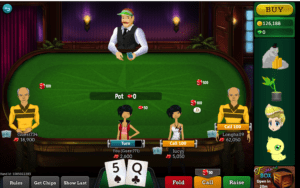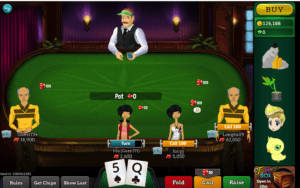I played the Multiplayer Poker game on Vegas World, an online game by FlowPlay. This game was designed for people who already know how to play Texas Hold ‘Em, possibly looking to practice poker and develop strategies by playing with other players.
Mechanics of this game include providing players two cards with each turn, allowing them to fold, call, or raise. The objective of the game is to win as much money as possible. With this extrinsic motivation comes a sense of pleasure, allowing the game to achieve the sensation type of fun. Poker has a “playing the player” element. By playing mental games such as bluffing, you can cause other players to fold even though the can’t see your hand. You can choose to place high bets to make other players believe that you have a good hand. If successful, you win the pot without having a complete poker hand. This is a reason why players associate winning with skill even though poker is a game of chance. For example, in the above screenshot, I had a 5 of spades and a queen of clubs. This doesn’t yield a possible hand, so logically, I would fold (which I did). However, a player may choose to bluff and continue placing bets, misleading their opponents. Making the decision between bluffing or playing logically impacts the outcome of each round. Either way, you may either lose or win money. Another way a player may associate poker with skill is through understanding the probability of obtaining poker hands. This may inform a players decision of whether or not to raise or fold. The mentality of “I have a high chance of obtaining this hand” feeds into addiction, even though the chance of not obtaining the hand still exists.
The mechanic of possibly never needing to show your hand (e.g. if everyone else folds) allows for players to win rounds regardless of their cards. There is always a chance to win. This mechanic may put players at risk for addiction. If players believe they can successfully play the players, causing them to react in favorable ways (folding, raising bets so you earn more money if you win, etc.) they may be willing to risk more money to earn more money. With the mechanic of raising the required amount of money to bet each round, every player risks more money. Even if have obtained a lot of money, it is still very possible to lose everything. The satisfaction of temporarily earning money promotes ambition and addiction.
Another game of chance I enjoy is Thirteen, a strategic game where you must “play the players” into revealing their valuable cards/strategically starting patterns that other players cannot play. This game is similar to poker in the sense that even if you arguably have “bad” cards, you can strategically cause others to play in your favor. It is different because Thirteen doesn’t require mental games. You do not need to make other players believe that you have something you don’t.





